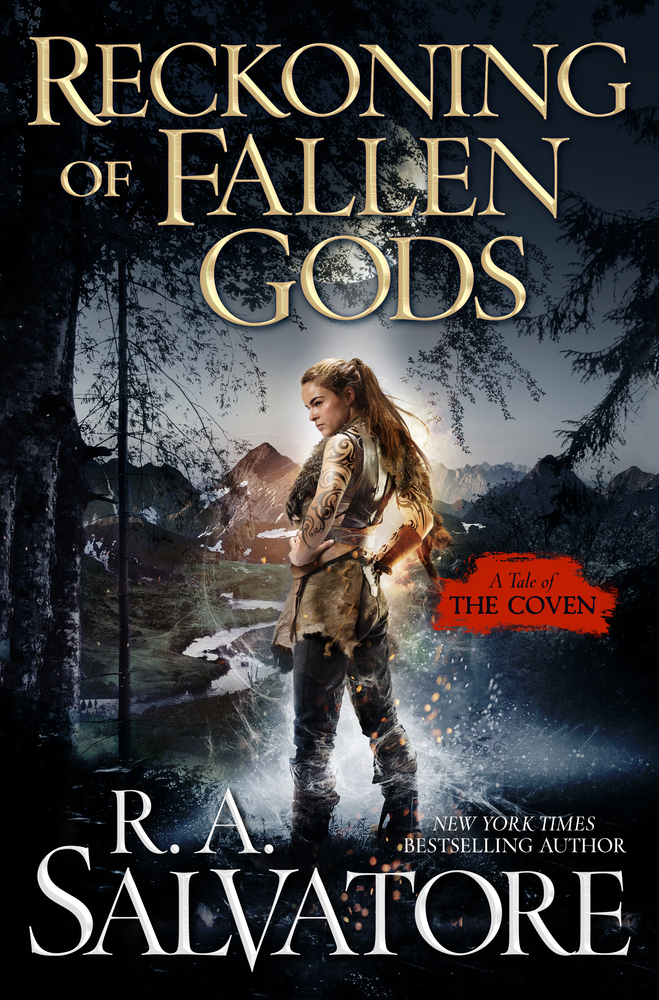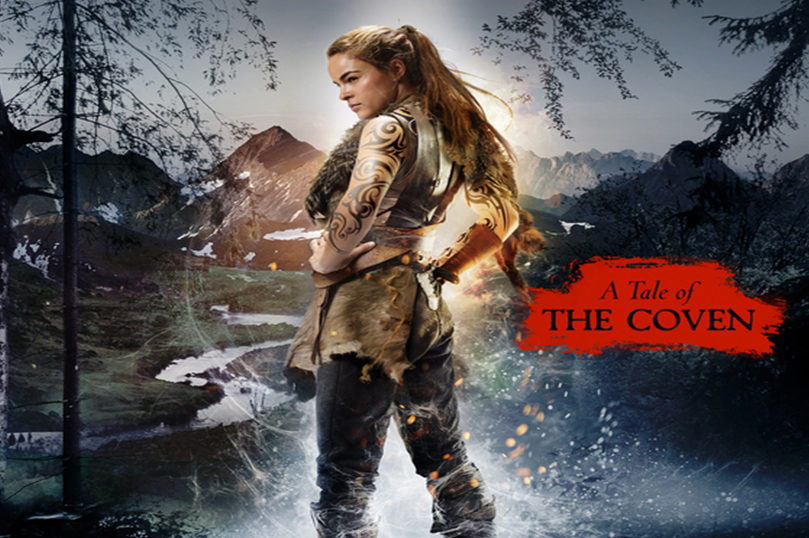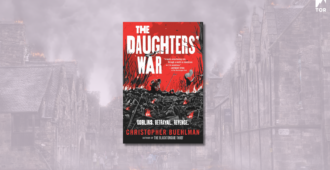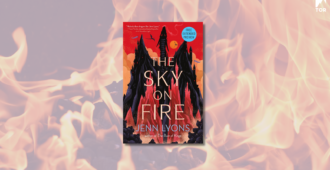 The winds of change are blowing upon Fireach Speur. Aoelyn risked her life to save the trader Talmadge and it cost her everything that is dear to her, but Talmadge survived and can’t forget the amazing woman that killed a god.
The winds of change are blowing upon Fireach Speur. Aoelyn risked her life to save the trader Talmadge and it cost her everything that is dear to her, but Talmadge survived and can’t forget the amazing woman that killed a god.
Little do they realize, war is coming to the mountain. Far to the west, a fallen empire stirs. One that sees a solar eclipse as a call to war. Their empire once dominated the known world and they want it back.
Reckoning of Fallen Gods will be available on January 29. Please enjoy this excerpt.
7
More than two-score mountain goblins milled about in a mob, brandishing their crude spears and clubs in all directions. They were not of the same tribe. Some were the remnants of a fight with the Usgar, others had lived not on Fireach Speuer, but in other mountains near to Loch Beag, or in dark holes deep underground.
But they had all come to this place, all compelled by voices in their heads, and all at the same time: the morning following the red moon.
They didn’t know why. They didn’t know how. But none could ignore the compulsion. They had been called, and so they had come as fast as they could. Now that they had arrived, however, those inner voices were no more, and they found themselves in a red stone valley almost completely encircled by high cliffs and crowded by other mountain goblins they did not know. Soon after, the howling had begun, all around them, yipping and melodic choruses singing words they did not know. The songs and cries echoed off the stone walls, surrounding the gathered goblins, closing in on them. They backed against each other for support, unsure and afraid.
Forms appeared atop the cliffs, but only briefly, rushing about. Graceful forms, leaner than the mountain goblins, the humanoids more resembled men, and yet did not, and seemed to be something else. The mountain goblins tightened their defensive formation, glancing about nervously, expecting spears to rain down upon them. There was only one way out of this box canyon, a narrow trail between high walls that could be easily turned into a slaughter zone.
Ropes came flying over the cliffs, bound at the top and winding down to the ground, and lines of those lean humanoids followed quickly, flipping about on the ropes with practiced ease, and rappelling down into the canyon. Wearing overlapping flaps of dark green and golden-brown armor, the newcomers looked down as they rappelled, showing their bright faces to the group below. Others came over the ledge riding lizards, slowly picking their way down the nearly sheer cliffs, sitting way back in their saddles that they wouldn’t overbalance and flip their sticky-footed mounts from the cliff side.
On one especially large lizard came two riders, the driver in front and a passenger dressed in black, wearing a mask made of a huge vulture’s skull.
All about the canyon floor, mountain goblins looked to each other with surprise, and more than a few nodded in recognition. To the humans on the other side of the mountains, the mountain goblins were also known as the sidhe, but that was a misnomer, a misunderstanding of the name, which had been coined by the humans not for the mountain goblins, but for these graceful, bright-faced humanoids now filtering down the cliffs.
But that was all long ago, eons ago, before the fossa had come to Fireach Speuer, even, and the mountain goblins had little knowledge, only folklore, of these strange-looking humanoids, with their bright red, huge and flat noses, and bright patches of blue or white on the cheeks beside.
The mountain goblins, no strangers to warfare, did understand, however, that these approaching humanoids could have simply rained rocks and spears upon them. If these newcomers had wanted a battle, it would have been a simple slaughter. Yet, they were coming down.
And so gracefully. They slid to the ground on their ropes, landing lightly and turning about. The last down were the lizard riders, the last of them the driver carrying the black-robed one, and as the others settled about the edge of the canyon floor, he alone approached the gathered mob.
Scores of crude spears were leveled at him, but he seemed unconcerned. “My cousins,” he said in the mountain goblin language, and in a voice that echoed throughout the canyon, a voice that every mountain goblin in that canyon knew well, for it was indeed the same voice that had sounded within their heads compelling them to come to this place.
The spears and clubs lowered.
Skath-mi-Zahn, the God-King of the Xoconai, was neither a god nor a king, but a child, a young xoconai. Descended from a long line of God-Kings, the youngster had never seen the outside of his pyramidal temple, and his only interactions happened with the augurs who tended him, and the supplicants they occasionally brought before him.
This day, like all days, the God-King sat on his throne, a beautiful and elegant golden seat, polished and shining. Perched on the precious chair, atop a marble dais in the center of the voluminous, shining, beautiful circular room, he waited. He had become quite adept at waiting.
All about the floor of the room, in their black robes and animal skull condoral masks, a bevy of xoconai augurs swept across the room, and several others swept the other way, crossing through doors, parchments under their arms, attendants in tow, going about their business without acknowledging Skath-mi-Zahn. This was normal; the augurs only ever acknowledged the child God-King when they needed something from him—a signature on a decree, a formal recitation of an edict they had crafted for him—or on those much rarer occasions when Skath-mi-Zahn demanded something of them (something the clever old augurs would inevitably mold to fit their own desires).
The bustle in the great chamber of the xoconai city was unusual this day, with an air of urgency rarely seen. The augurs, so practiced in their ways, so mundane in their daily rituals, rushed about with eagerness and determination, but the God-King, so insulated and caught within the dullness that had been trained into his mind, hardly noticed.
He knew not what time it was—time was hardly a concept that occurred to the God-King, who spent his days and nights inside and had rarely glimpsed the sky—when an augur, who was titled and so named Pixquicauh, or High Priest of the Xoconai, entered and moved up to the base of the throne to address him directly.
He waited patiently, but Pixquicauh did not immediately speak. A second black-robed, skull-faced augur shambled up to stand beside the first, then another, and another. Five more, ten more, and soon, it seemed as if all the augurs of the great temple stood there before Skath-mi-Zahn.
“A momentous day, God-King,” Pixquicauh said behind his condor skull condoral.
“Speak!” the God-King commanded in a petulant voice, one full of frustrations so profound that the young servant, who thought himself a god, could not begin to comprehend.
“The sun was eaten this day. Vomited anew, for us,” said Pixquicauh, with great gravity and drama in his voice, a triumphant roar that made the naïve God-King think he should understand that something was important here.
“Vomited?” the young xoconai God-King asked, crinkling his face with disgust. “To me, why would you tell such a disgusting thing?”
Behind the grayish condoral, Pixquicauh sighed. “By the mouth of Kithkukulikahn shall the Shining Orb of Skath-mi-Zane’s day be taken. Kithkukulikahn, God-King. Your dragon.”
“My . . . dragon?” The child knew that his face was full of trepidation, but he couldn’t help it. He had been taught every day for his entire young life about who he was and about the glories of his previous life, when he had ridden a great winged serpent and conquered the world. He believed the stories, of course—it was all that he knew—but those lessons put such tales of heroism and brilliance far in the past, and spoke of any return to glory only far in the future.
“Let it be told that Kithkukulikahn is returned, oh Glorious Gold,” Pixquicauh insisted. “Tonalli was taken, the fiery orb of light returned. The light of day was taken, the light of day returned. It is the time.”
“The time?”
As one, the gathering of augurs turned about to face a door at the far end of the chamber. It swung open, and two more of the temple augurs entered the room, flanking a third augur in black robes, but one, the only one, who was not wearing a condoral.
The God-King sucked in his breath at the sight, for it was forbidden for any to approach him without wearing the appropriate death-mask!
But his loyal augurs ushered this one—this very old one, he realized— up to the throne.
The God-King stood, and all the augurs fell to their knees immediately.
Even the newcomer, the stranger with the old face bared to his god, knelt.
Skath-mi-Zahn leaned forward. “Stand,” he ordered, and all of the augurs began to rise.
“No!” he shouted. “No! No! No!” And they all fell back to their knees. “Just this one. Stand!”
The newcomer rose shakily on his old legs.
“Where is your death-mask?” Skath-mi-Zahn demanded.
The impertinent old xoconai snorted.
“He is of the old scrolls, Glorious Gold,” Pixquicauh explained, though it was hardly an explanation to the child pretender, who didn’t even know what the “old scrolls” might mean.
It didn’t bother him much, though, because Skath-mi-Zahn believed that he was going to have some fun soon enough. Sometimes when he ordered sacrifices, he was allowed to sever the head, slowly, easing the serrated knife back and forth while the victim wailed, then gurgled. He thought it very funny. In the case of this old and impudent augur, he would insist upon wielding the jagged knife.
“Upon my glory, you stare, without a death-mask,” Skath-mi-Zahn said. “You must die.”
The old, old augur wheezed and coughed in what Skath-mi-Zahn came to realize was a mocking laugh. The youngster started to squeal, demanding immediate execution, but none of the others rose. Wearing a sinister smile, the old augur said, “I am the Last Augur of Darkness, as was foretold. Through my line, my ancestors, my temple wall—and only there—were the signs remembered.”
“You wear no condoral!” the God-King screeched.
“I approach naked, as was foretold,” the Last Augur of Darkness replied. “For this day have my visions come to be. My eyes alone foresaw this day, my words alone warned. This day, through the unshaken faith of my line, when Cizinfozza, guardian of Teotl Tenamitl, has thinned to nothingness. When Kithkukulikahn then arose to tell us of the great happening by eating Tonalli. Days ago, my heart heard the departure of the evil beast. The dark fiend who slept upon the Teotl Tenamitl to watch over the flood and hold fast the land with the power of dead souls is no more. By mine eyes did I see, by my temple wall did I know, and so, forth I sent my mundunugu scouts.”
Skath-mi-Zahn swallowed hard, confused, and more than a little afraid. This augur wasn’t shying from him, wasn’t intimidated by him. For all the lessons and all the compliments and all the claims of his power, the child understood something, or feared it at least: his power rested fully upon others obeying him.
This one wasn’t.
“Kneel!” he commanded.
The old, old augur, the proclaimed Last Augur of Darkness, did not. “Scouts, you claim. What did they find?” Skath-mi-Zahn screamed, because he did not know what else to scream.
“They have not returned,” came the naked-faced xoconai’s calm reply. “But we do not need them. We have been shown. Your dragon ate the sun.”
“My dragon will eat you!” The God-King turned to Pixquicauh. “I want him to be killed! Now!”
“Glorious Gold, it is not the time,” Pixquicauh dared to reply, and dared to rise. “I say and so it has been told. There is one more thing we must do.”
“Must?”
“To confirm the words of the son of Bayan, who is the Last Augur of Darkness.”
Skath-mi-Zahn sputtered, having no idea of what Pixquicauh was babbling about.
“The signs have come to be,” Pixquicauh explained. “Glorious Gold, your beauty will shine greater than all who have worn the throne before you. But you must take up Tezacuit.”
“The Golden Rod?”
He knew of what Pixquicauh was speaking. In a dark room within the catacombs of the great temple, surrounded by the open tombs of the line of Skath-mi-Zahn, was a second throne, a dark and ugly seat carved of obsidian. Skath-mi-Zahn had only seen the place once, and that was years before, but he would never forget the sight. Or the feeling of that cold dungeon. For the black throne glowed, or un-glowed, he thought, casting an aura of dusty blackness that reduced even the largest torches to pinpricks of light.
Just enough to see the red veins shot through the seat—the veins of all the God-Kings, the blood of Skath-mi-Zahn—and the brilliant reflection of the throne’s deadly trap. For yes, set within that seat was a bejeweled golden rod, Tezacuit, a scepter which protruded between the legs of anyone seated upon the throne like some glorious and erect cock. A weapon, the God-King remembered then, that would strike mortally at any who dared sit upon the obsidian throne.
“Take it up?” he asked under his breath, having no idea what that might mean.
“Rise!” the Last Augur of Darkness commanded.
“You do not . . .” Skath-mi-Zahn started to argue.
But Pixquicauh intervened, seconding the call with a resounding, “Rise!” The gathering of black-robed augurs stood up and parted, forming a double line, and Pixquicauh ushered the God-King between them, the procacious, unmasked old augur following close behind.
“Cizinfozza has gone,” the augur said to his commander, a warrior, or macana, so named for the war clubs they typically carried, fabulous flat-barreled bats of greenish brown, streaked with fine silver veins and lined with the teeth of giant lizards.
“They are his smelly children,” the disgusted warrior replied, indicating the growing camp of the gathered mountain goblins, now some hundred strong. “The goblin god’s stench remains.”
The augur gave a low growl behind his condoral. It was true enough, to some extent, and he, too, could hardly hide his contempt for these bastard creatures, though he constantly reminded himself that they were created, according to xoconai lore, because their own god demanded that his children love the children of Cizinfozza, and so improve their pathetic bloodline with that of the xoconai. The goblins were the children of the demon god, and so should be killed, but these creatures, which the xoconai called xelquiza, or half-bloods, were a more complicated lot. For they were descended of goblins, and descended of xoconai.
Children of Skath-mi-Zahn.
Children, too, of Cizinfozza.
“Our mercy would be shown in killing them,” said the macana.
“Our wisdom would be shown in letting the humans do it,” the augur replied. “The xelquiza know the passes about Teotl Tenamitl and many have navigated Tzatzini. Their hatred of the humans is more than our own. Let them lead the way. Let them be destroyed while destroying our enemies, that they may be of some value to we who made them stronger.”
“When?” the macana demanded. “More we will need to guard them than we would to guard against humans, or great cats, or bears, or the black-winged totot. They will kill us if they can.”
“They will not.”
“They will, augur.”
The augur shook his head, but let it go. “Tonalli was eaten and vomited. The Glorious Gold will rouse and gather the armies of Tonoloya. Soon. Soon.”
“Before the snows?”
The augur did not answer, other than to stare hard. The snows were already beginning in some of the higher passes, after all.
The macana didn’t seem pleased, but he let it go at that.
Later that afternoon, they learned that more xelquiza had been rounded up by other xoconai far to the south. These intended shock troops were already marching north to the foothills to join with the augurs here.
The augur and the macana together looked to the wall of mountains they called Teotl Tenamitl, hoping the scouts of the Last Augur of Darkness, an old xoconai they had thought mad not so long ago, would soon return. No, not the actual scouts, actually, for the journey from the mountain they called Tzatzini to this place would take weeks.
But the xoconai knew how to pass the words much more quickly, shout to shout, or using smoke signals and reflections of the sun off polished golden surfaces. Their spies were scattered about those mountains from time untold, replaced every two seasons.
The augur and the macana looked back the other way, to the west and the wide basin that led to the sea where the fiery orb of Tonalli extinguished its fires and slept each night, toward the great cities of their people, though none could be seen from this particular area.
Word would pass through those cities, from sovereign to sovereign to their xoconai constituents, east to west.
That word, that call, would bring the armies from the west, to follow in the steps of these leading xelquiza forces, the steps that would take the xoconai back home.
It would be a glorious day.
Who knew how many thousands of seasons had passed since the golden scepter had been placed in this stone? It was beyond the ancestral memories of the oldest xoconai bloodlines, beyond the chants, prayers, and visions of the augurs, even the Last Augur of Darkness.
In this dark and rarely visited place beneath the great pyramid, set in the obsidian stone, amidst the eternal lava dust that stole the glow of torches, the golden scepter named Tezacuit was not held by chains or ridges. It simply was, as if it had grown from the seat of the throne, protruding as solidly as if it was part of the stone itself.
Many had tried to take it, tugging futilely. The strongest xoconai macana had grasped the scepter and pulled until their arms and backs ached, or until, it was told, the scepter had tired of them, and so had melted them to ash.
Only a century before, a sovereign of a great city, emboldened by the landslide of a vote that had placed her upon her seat of governorship, had thought herself the embodiment and so had grasped Tezacuit, and had been reduced to bone, then to ash, before her devoted officers. That event had thrown xoconai society into turmoil, for how could so many have voted so wrongly?
In the more distant past, wars had been fought among the xoconai nations over the scepter. In the dark days of Tumult, ten thousand xoconai had died in or about this very temple, as sovereigns vied for the prize.
Yet, here it remained, unbothered, divine, beyond them.
The augurs formed a circle about the dais. Pixquicauh and the old augur flanked the young God-King as he approached.
Even in the muted torchlight, the scepter shone. No dust could touch it— never did it need to be polished.
“Sit,” Pixquicauh ordered the God-King.
The child looked at him, suddenly very afraid.
“What if we are wrong?” he asked, barely able to get the words out. “Then Tezacuit will eat you,” the Last Augur of Darkness told him, and nothing in the old one’s tone suggested that he was speaking in jest. Both the God-King and Pixquicauh stared in horror at the unmasked old augur of the line of Bayan.
“It is true” was all that he would say to those expressions.
“But we are not wrong, God-King,” Pixquicauh prompted, but there was no missing the doubt in his voice.
“We are not wrong. It has been told,” agreed the old augur, with full confidence. For it was he, and he alone, with knowledge passed from his great grandsire, who had foretold the event. He alone was the “we” of whom Pixquicauh spoke.
“You do it, then,” the God-King insisted.
The old augur wheezed out a laugh. “Whether the prophecy is right or wrong, any but the Glorious Gold who grasp Tezacuit will fail, and will be consumed,” he replied.
“Then I shall make you do it . . .” the child began to demand.
“God-King,” Pixquicauh interrupted, and when young Skath-mi-Zahn snapped around to regard him, the high priest motioned to the obsidian throne. “Sit.”
“It will kill me!” the child cried and hesitated.
But the old augur took hold of him and hoisted him up, dragging him over to the seat. The high priest reflexively grabbed the old augur to stop him.
“You doubt?” the Last Augur of Darkness accused, and all about the dais, the xoconai augurs gasped behind their condorals, and Pixquicauh fell back, shaken, and began to pray.
The old augur dropped the child into the seat, his legs straddling the scepter far too short for his feet to come anywhere near the floor.
“Now is the time,” the Last Augur of Darkness told the God-King. “Now is the Cuowitay, the Day of the Xoconai. It is said and it has been told.”
The child stared at him.
“Grasp it!” the old augur yelled, so suddenly and so forcefully that poor Skath-mi-Zahn had the scepter in both hands before he even consciously registered his own movements. A horrified look came over him and he pulled back, trying to let go.
But he could not, and arcs of blue lightning began to crackle about his fingers and shoot up his arms. He screamed—how he screamed!—and he thrashed, but the scepter would not let go.
A great wind howled through the underground chamber, blowing out the torches and scattering the black lava dust. But the dungeon did not go dark, far from it, for Tezacuit began to glow, bright white flames swirling about it, over Skath-mi-Zane’s child hands.
He screamed louder, though whether in horror or agony, the gathered priests could not tell.
The white flames grew, climbing up his arms, but his screaming changed to singing, a most beautiful song, its light notes full of promise and hope.
As one, the augurs shielded their eyes from the blinding light and heat as the white flames climbed higher, engulfing the child, growing.
The fires came alive. They leaped away from the God-King, reigniting the torches.
And on the obsidian throne sat no child, but a xoconai man, a tall and glorious xoconai, his head framed in hair made of sunshine, his nose the brightest red, lined by blue so brilliant that it would shame a crisp autumn sky, and that framed by white purer and more profound than the midwinter snow on the peaks of Teotl Tenamitl. These were more than mere colors, it seemed, as if the being’s face itself was the personification of those hues, in brilliance unmatched.
No more was the golden scepter, Tezacuit, set in the chair, and the hole where it had been, if there ever was a hole, was healed, the seat simply a plane of polished, unblemished, shining obsidian, with no sign that it had ever been anything else.
The beautiful creature held the last notes of his song, and they hung in the air for a long while after he had stopped singing.
He turned to face the high priest, who fell to his knees and prostrated himself, shaking uncontrollably, as did all the others in the chamber, even the stubborn and proud old augur of the line of Bayan.
“Who am I?” the being demanded.
“Skath-mi-Zahn!” Pixquicauh cried, and others followed. “Scathmizzane!” the true xoconai God-King corrected, changing the inflection and emphasis of the name. “Rise!” he ordered, and the augurs climbed to their feet.
The God-King stood up and motioned for the high priest to come to him. Pixquicauh moved slowly, so obviously terrified and awestricken.
“You did not believe this day of prophecy,” Scathmizzane said.
“I did, Glorious Gold!” he shrieked, falling to his knees and dropping his masked face into his hands in shame.
“You tried to stop the Last Augur of Darkness from placing the child I was onto the throne,” Scathmizzane said simply, and Pixquicauh wailed.
“Only you knew,” Scathmizzane said, looking to the old augur, who stood perfectly at ease.
“They said and it has been told,” he replied with confidence. Scathmizzane lowered the end of his golden scepter under the downfacing condoral of the high priest, and without effort, he used only that to lift the xoconai to his feet, then tilted his face so that he could look into his eyes.
A wave of the God-King’s hand sent Pixquicauh’s condoral and black robes flying away.
The God-King kissed the high priest. And held the kiss. Pixquicauh groaned and moaned in undeniable, almost unimaginable, ecstasy. It went on and on, and the others in the chamber stared and gasped, and cried at the beauty, and prayed they would one day know such divine joy.
But the timbre of those orgasmic moans shifted, became cries, became shrieks.
And the high priest’s face and form seemed to shrink, as if all the fluid in his body was being taken from him, shriveling him into a desiccated husk. And it continued, and his skin began to peel and shrivel, and roll apart to flow, too, into the mouth of Scathmizzane.
White bone showed in patches all about the naked form of the xoconai high priest, then more still, emerging from the melting flesh.
When he was just a skeleton, Scathmizzane relented and pulled away, and the high priest, somehow not yet dead, clattered about as if in confusion, waving his bone arms, and turning his bare skull this way and that, his eyeballs, the only thing left of him that wasn’t bone, searching desperately.
Then he fell apart, a pile of bones, and two bulging eyes—eyes remaining as if to forever look upon the error of his doubts.
But no! For Scathmizzane waved Tezacuit and summoned the skull of the high priest to his grasp. He turned to the old augur and bade him to come forward.
Without the slightest hesitation in his step, the old augur walked up, and accepted the kiss of Scathmizzane.
And he knew divine joy. On and on it went, but when it stopped, when the God-King pulled back, the augur remained intact. Scathmizzane’s glory had not melted him.
Scathmizzane smiled and nodded, but then, so suddenly that none could even follow the movement, the God-King shoved the skull of the high priest against the face of the old augur, whose arms went straight out to the sides, shaking in agony, grasping helplessly at the air.
And he screamed as if the fires of Tonalli itself were burning within him.
Then it was over, so quickly, and the old augur still stood, except that now he wore the bone mask and bulging, fleshless eyes of the dead man.
No, no mask, he realized, and so did the others, for it was fused to him, surely.
This was his face now.
“No more are you the Last Augur of Darkness,” Scathmizzane proclaimed. “Now you are the First Augur of the Light. I name you Pixquicauh, High Priest of Scathmizzane.”
“It is said and so it has been told,” the new Pixquicauh recited obediently, and there was strength in his voice, power beyond anything he had ever before known.
Scathmizzane stared at him for a few long heartbeats. “You know what to do,” the God-King prompted.
Pixquicauh spun about to address the whole of the gathering, and they saw that the jaw of his fused xoconai condoral did not move when he spoke, though his undead, bulging eyes did roll to scan them as he commanded.
“Go!” he told them. “Tell the sovereigns of Cuowitay. Gather the armies.”
Copyright © 2019
Order Your Copy











